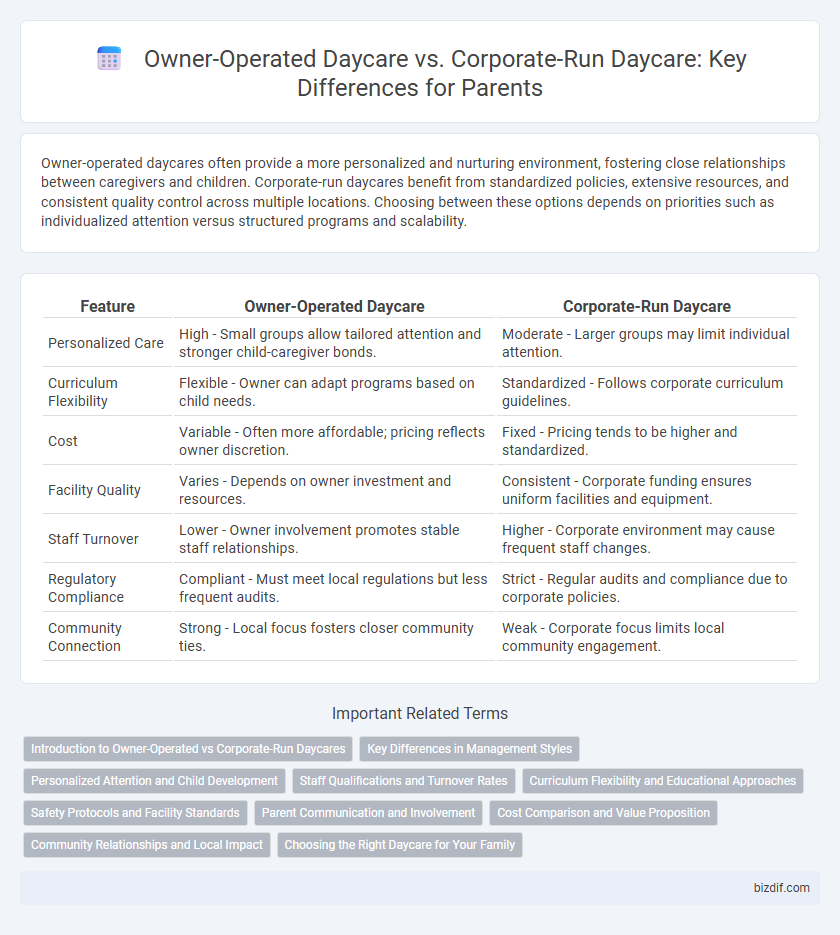Owner-operated daycares often provide a more personalized and nurturing environment, fostering close relationships between caregivers and children. Corporate-run daycares benefit from standardized policies, extensive resources, and consistent quality control across multiple locations. Choosing between these options depends on priorities such as individualized attention versus structured programs and scalability.
Table of Comparison
| Feature | Owner-Operated Daycare | Corporate-Run Daycare |
|---|---|---|
| Personalized Care | High - Small groups allow tailored attention and stronger child-caregiver bonds. | Moderate - Larger groups may limit individual attention. |
| Curriculum Flexibility | Flexible - Owner can adapt programs based on child needs. | Standardized - Follows corporate curriculum guidelines. |
| Cost | Variable - Often more affordable; pricing reflects owner discretion. | Fixed - Pricing tends to be higher and standardized. |
| Facility Quality | Varies - Depends on owner investment and resources. | Consistent - Corporate funding ensures uniform facilities and equipment. |
| Staff Turnover | Lower - Owner involvement promotes stable staff relationships. | Higher - Corporate environment may cause frequent staff changes. |
| Regulatory Compliance | Compliant - Must meet local regulations but less frequent audits. | Strict - Regular audits and compliance due to corporate policies. |
| Community Connection | Strong - Local focus fosters closer community ties. | Weak - Corporate focus limits local community engagement. |
Introduction to Owner-Operated vs Corporate-Run Daycares
Owner-operated daycares typically offer personalized care with a smaller child-to-caregiver ratio, fostering a home-like environment focused on individualized attention. Corporate-run daycares tend to have standardized curricula, larger facilities, and structured operational policies designed to ensure consistency across multiple locations. Understanding these key differences helps parents choose between the tailored approach of owner-operated centers and the scalability and resources found in corporate-run daycare programs.
Key Differences in Management Styles
Owner-operated daycares emphasize personalized care and flexibility, allowing direct involvement of the owner in daily activities and decision-making. Corporate-run daycares follow standardized procedures and formal management structures, ensuring consistency and scalability across multiple locations. The hands-on approach in owner-operated settings often fosters closer relationships with children and parents, while corporate centers benefit from established policies and extensive resources.
Personalized Attention and Child Development
Owner-operated daycares typically provide personalized attention by maintaining smaller child-to-caregiver ratios, fostering stronger relationships that support individual child development. Corporate-run daycares often follow standardized curricula and protocols, which can limit flexibility but ensure consistency in educational approaches. Research indicates children in owner-operated settings benefit from tailored activities that adapt to their unique developmental needs, enhancing social and cognitive growth.
Staff Qualifications and Turnover Rates
Owner-operated daycares often feature staff with higher qualifications, as owners tend to prioritize experienced caregivers to ensure quality care and maintain a personal reputation. Corporate-run daycares may experience higher turnover rates due to standardized policies and less individualized management, which can impact staff morale and consistency in care. Studies indicate that lower turnover in owner-operated settings contributes to stronger child-staff bonds and more stable learning environments.
Curriculum Flexibility and Educational Approaches
Owner-operated daycares often provide greater curriculum flexibility, allowing personalized educational approaches tailored to individual children's needs and family values. Corporate-run daycares typically follow standardized curricula designed for consistency across multiple locations, prioritizing efficiency and scalability over customization. This distinction impacts the adaptability of teaching methods, with owner-operated settings fostering more innovative and child-centered learning experiences.
Safety Protocols and Facility Standards
Owner-operated daycares often implement personalized safety protocols tailored to smaller groups, ensuring immediate attention to facility cleanliness, child-to-staff ratios, and emergency preparedness. Corporate-run daycares generally follow standardized safety procedures and facility standards mandated by regulatory bodies, benefiting from consistent training programs and certified equipment across multiple locations. Choosing between the two depends on priorities such as individualized care versus uniform compliance with national safety certifications and facility audits.
Parent Communication and Involvement
Owner-operated daycares often provide personalized parent communication through direct interactions with caregivers, fostering stronger relationships and tailored updates on child progress. Corporate-run daycares typically use standardized communication tools like apps and newsletters, which ensure consistent information but may lack individualized attention. Parents in owner-operated settings tend to have greater opportunities for involvement, benefiting from flexible policies that encourage participation in daily activities and decision-making.
Cost Comparison and Value Proposition
Owner-operated daycares typically offer lower tuition fees compared to corporate-run daycares, as they have fewer overhead costs and streamlined operations. Corporate-run daycares often provide a wider range of structured programs and enhanced safety protocols, which can justify higher prices through added value. Parents seeking personalized care and affordability may prefer owner-operated options, while those emphasizing standardized services and extensive resources might opt for corporate facilities.
Community Relationships and Local Impact
Owner-operated daycares typically foster stronger community relationships by offering personalized care and engaging directly with local families, which enhances trust and neighborhood cohesion. Corporate-run daycares often implement standardized programs that may lack customization but provide consistent quality and resources across multiple locations. The local impact of owner-operated centers is more significant in supporting small businesses and responding to community-specific needs, while corporate daycares focus on scalability and broader market presence.
Choosing the Right Daycare for Your Family
Owner-operated daycares often provide personalized care with consistent caregivers, fostering strong relationships and tailored attention to each child's needs. Corporate-run daycares may offer standardized programs, extensive resources, and regulatory compliance, ensuring structured environments and scalable services. Evaluating factors such as caregiver consistency, program quality, safety standards, and family values is essential when choosing the right daycare for your family.
Owner-operated daycare vs corporate-run daycare Infographic

 bizdif.com
bizdif.com